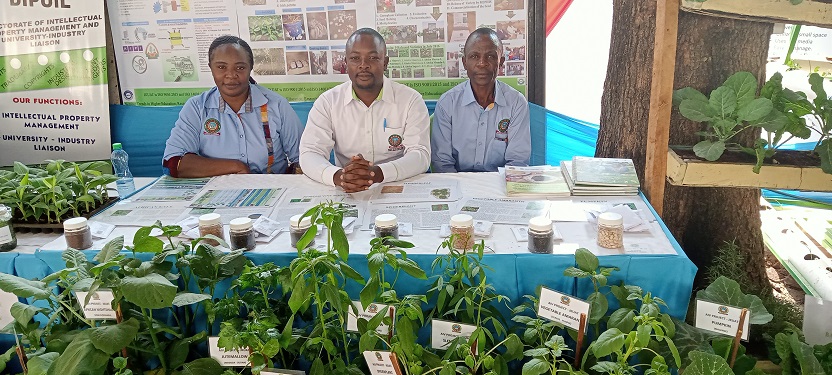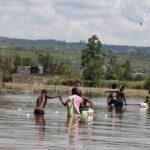
extension with his colleagues at the Nairobi International Trade Fair.
By Tebby Otieno | tebbyotieno62@gmail.com
Sylvia Munyoki, 44, walks around the Nairobi International Trade Fair grounds with hopes of getting more indigenous seeds to expand her vegetable kitchen garden.
Her passion for indigenous vegetables began when she grew up in Makueni County. She recalls her parents plucking and cooking indigenous vegetables that grew on their own.
“I like indigenous vegetables so much that I share them with rabbits. These are the vegetables that grow naturally in the forests, and I adore them,” she says.
Munyoki is, however, disturbed that the vegetables are no longer available. She decries the fact that the seeds have gone missing, and was therefore happy to obtain some during the agricultural exhibition.
“I live on a quarter-hectare plot of land and grow a lot of indigenous vegetables. I have a variety of indigenous vegetables in my kitchen garden, that is why you see I have purchased the African vine spinach, African kale, and pumpkins that I am going to plant,” she says.
The difficulty in obtaining indigenous vegetable seeds is not new. A survey carried out by researchers at Jomo Kenyatta University of Agriculture and Technology (JKUAT) on African Indigenous Vegetables (AIVs) showed that the seeds are disappearing because the vegetables no longer grow on their own.
“We did sampling of seeds from different varieties of vegetables, including African night shade (managu), the spider plant (saga), jute mallow (mrenda), amaranth specifically the ododo one because amaranth has so many lines, nderema, mitoo and pumpkins and our own Ethiopian African kale or kanzira,” says Alfred Wanzala from JKUAT’s directorate of research, production and extension.
The project’s nationwide survey prioritised the Western and Nyanza regions, which have the highest prevalence of AIVs. The various samples collected were taken to the university, where researchers conducted studies with various parameters. The survey included questions about how they grow, which climate they prefer, what they need, and the best conditions for growing AIVs.
The findings led to JKUAT researchers developing some superior seed varieties, which they then forwarded to the Kenya Plant Health Inspectorate Services (KEPHIS), the country’s organisation tasked with quantification and certification.
This resulted in the release and gazettement of nine AIV seed varieties that can be rolled out and distributed to farmers for proper vegetable production.
The studies by JKUAT also discovered that AIVs lack proper production protocols, farmer neglect, and recipes that highlight the key nutrition elements obtained from AIVs, which are all issues that the institution has since resolved.
According to Wanzala, JKUAT is currently running a project in which a team of agricultural experts visits small-scale farmers and trains them on planting protocols through on-site farm demonstrations and the provision of proper planting materials. This, he says, helps farmers to properly prepare land, do proper demarcation, proper spacing, and use proper quantity of seeds, as opposed to traditional methods in which farmers broadcast seeds and end up wasting a lot or underutilising them.
“For proper usage of seeds in a plot measuring 10 by 10 metres you only need 25 grams of most of these vegetables and you will get maximum production. It’s recommended that you do 30 centimetres from one line to another and 20 centimetres from one seed to another,” Wanzala explains.
The research also showed that AIVs are overlooked by stakeholders who believe they belong to poor families, despite the health benefits they have.
Wanzala, however, is pleased that this is changing, with five-star hotels already beginning to include them in the diet. JKUAT is also involving schools in their outreach programme to encourage students to form 4K clubs and plant AIVs.
“We want people also to be independent because the complaints we have been getting from farmers is that they go to agro-vets, buy seeds but they do not germinate. At JKUAT, we train farmers on a whole package from land preparation, planting, vegetable maintenance, harvesting to recipes,” he says. At the end, the farmers regenerate their own seeds.
The research also shows that nine in every 10 AIVs farmers depend on regenerated seed.
Wanzala says through proper farming, farmers will harvest enough of the vegetables that they will eat, sell and also get bulk seeds for own consumption and surplus to share with their neighbours.
Mary Abukutsa, a professor of horticulture and researcher at JKUAT, says climate change has an impact on AIVs, while the vegetables can also be used to mitigate climate change impacts.
“When there is drought, we do pre-season agriculture by putting some of the climate-smart technologies in place to ensure that you give enough water to the plant to produce,” says Prof Abukutsa.
The issue of perishability also arises as vegetables grow well during the rainy seasons when farmers would have vegetables in plenty while during dry season they face shortages.
But with the findings, JKUAT has solved the challenge by coming up with the preservation methods.
Through this solution the vegetables are dried using a solar dryer before packaging them to ensure they are in optimal condition that make them fit for consumption even one year after harvesting without being frozen.
Prof Abukutsa encourages farmers to use the rain by planting indigenous vegetables, as some parts of Kenya are already receiving rains following a prolonged drought that resulted in food shortages.
“For example, cabbage takes six months to get ready while AIVs take only a month to be ready. So, even with a little rain, you will still have your harvest. Some of them are also drought resistant,” she says.








